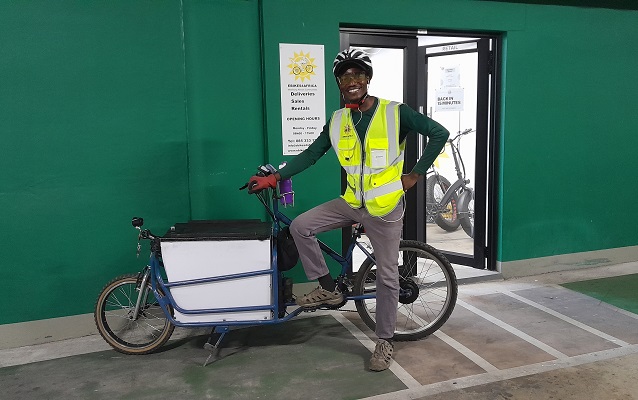Locally manufactured E-Bikes with rental system for peri-urban communities

Windhoek has seen an influx of people from rural areas, caused by economic reasons, but also in response to climate change effects. As public transport does not serve the outlying urban areas, these communities do not have access to them. Consequently, many people spend a significant proportion of their income on transport or walk long distances, which especially for women can be unsafe. This IKI Small Grants project aims to introduce solar-powered e-bikes and e-cargo bikes to reduce greenhouse gas emissions of the transport sector. The project targets individuals from underserved communities, with a focus on (female) commuters, street vendors, and local entrepreneurs. At the same time, 16 students from a nearby university and college are trained to set up the hubs and manufacture a total of 24 e-bikes. The established e-hub is handed over to the Namibian Women’s Association (NAWA) and managed by two extensively trained e-hub managers.
INITIAL SITUATION
A lack of adequate, affordable, safe, and sustainable transport is a major barrier to accessing opportunities for a large percentage of the population in Windhoek, Namibia. These communities do not have access to public transport, as taxis and busses do not serve the outlying areas. Many households spend a significant proportion of their disposable income on transport or must walk long distances, which can be unsafe, especially for women.
TARGET GROUP
The project targets two groups of local beneficiaries: firstly, the university and vocational training students, who play a key part in manufacturing the E-Bikes. 16 students learn in a one-year internship to operate E-Hubs.
The second target group are individuals from underserved communities, with a focus on (female) commuters, street vendors, and local entrepreneurs who reduce transport expenses and boost their business through increased access to customers.
APPROACH AND ACTIVITIES
The project’s main goal is to reduce greenhouse gas emissions in the transport sector and provide sustainable transport on the outskirts of Windhoek. This is achieved through the introduction of locally manufactured solar-powered E-Bikes/E-Cargo-Bikes to local users, made accessible through an affordable rental system.
The E-Hub or Micro Factory, which is set up at Jakob Marengo Tutorial College (JMTC) by the Namibian Women’s Association (NAWA), serves as a manufacturing workshop. This E-Hub is also used as a main e-bike rental station and battery charging station for users from the informal settlements. It consists of three modified shipping containers.
To set up this E-Hub, the project firstly researches on different designs of e-bikes and e-cargo bikes to provide necessary theoretical background material for the further trainings. With a timeframe of six months, the team sets up the infrastructure of the E-Hub and manufactures 24 e-Bikes or e-cargo bikes.
Afterwards, these e-Bikes are made available for rent to the target population. The use of e-Bikes and e-cargo bikes can create income, reduce mobility and transportation expenses, and mitigate emissions. During this phase, data is collected to improve the product quality in the long-term. After being self-sustainable, the established E-Hub is handed over to JMTC / NAWA. It is then managed by two E-Hub managers, who have been trained extensively in relevant areas of expertise during the project duration.
The project can serve as a blueprint for additional e-hubs around Windhoek and the northern regions of Namibia. In addition, the knowledge gained within the project benefits future students to be able to continue, improve, and upscale the concepts.
ABOUT THE ORGANISATION
EBIKES4AFRICA is a social enterprise that specialises in electric mobility and solar recharge systems. Their locally designed e-mobility solutions help Africans move towards a more sustainable future. As the first to introduce this technology to developing countries, they believe that their products and projects create the opportunity for Africa to be on the forefront of future-driven transport development initiatives.
A pioneering project for Namibia and Africa, EBIKES4AFRICA provides electric-assist bicycles to beneficiaries for whom conventional bicycles are limited in their usefulness, and a car not an option. Electric bicycles are the most affordable and efficient way of moving, and because it is supported by an electric motor and battery, significantly increases distance, speed, and ease of travel for better access to vital facilities.
